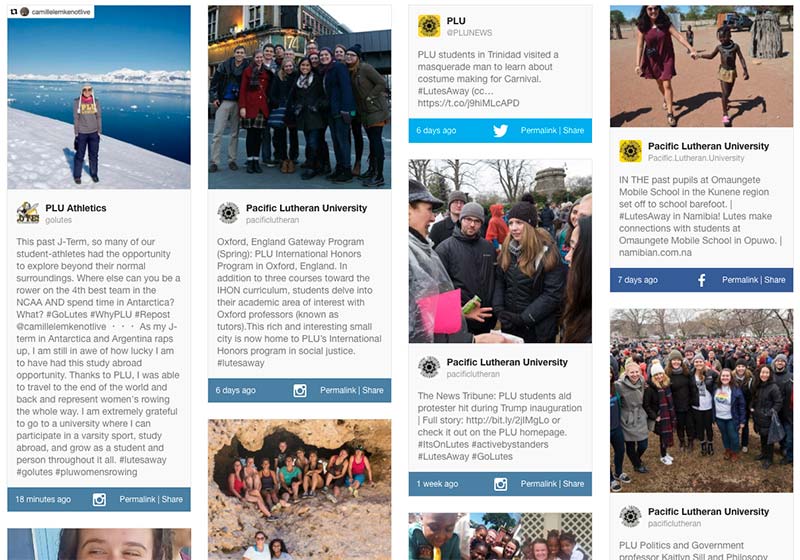Three continents and five languages later, Yannet Urgessa ’16 found her unapologetic self at PLU
Yannet Urgessa ’16 feels comfortable here, and she’s got the hair to prove it. It’s big. It’s curly. And, she says, it’s unapologetically black.
“A lot of growth I’ve done is reflected in my hair,” she said.
Urgessa didn’t always wear her confidence so proudly on her head. After emigrating from Ethiopia, she grew up in Bergen, Norway, among a sea of silky, blond hair.
She said wearing her hair in an Afro “freaked my friends out.” So, from the time she was 13 years old, Urgessa straightened her hair daily.
The decision catered to her white friends, she says in hindsight. She sacrificed the health of her hair to make them feel comfortable, and the damage went deeper than her roots and split ends.
“I don’t care for my hair when it’s straight,” she said. “When it’s out and big, it’s me being myself.”
When Urgessa talks about the stages of her hair, it’s more than a statement about fashion or beauty. It’s a symbol of her constant identity struggle, an indicator of the growth she’s made as an international student at Pacific Lutheran University.
Her family relocated when she was 6 years old, fleeing a country rife with political instability. Her family never abandoned their ethnic Oromo roots, but actively immersed themselves in their new culture.
Now, she’s relocated again, extending her international education to a third continent as a sociology major at PLU.
The university’s commitment to global education is a value that’s familiar to Urgessa. She speaks five languages — Amhara and Oromo that are native to Ethiopia, English, Norwegian and German — and learned from an early age to act as a citizen of the world.
“My parents did a really good job of fostering a global community within our household,” she said.
Urgessa spends a lot of time thinking about her identity and how it fits within that global community. “After I came to PLU, that’s when I had the biggest struggle figuring out how to identify who I am,” she said.
Once she arrived, she interacted with students of color who were confident in their own skin.
“I had never experienced that before,” she said. Many of her new friends at PLU were social justice advocates who “embraced their blackness,” she said, and it inspired her to follow their lead.
So, among other changes, she stopped straightening her hair. Through her newfound support system, immersion in PLU’s Diversity Center and sociology classes, Urgessa became equally comfortable in her own skin in yet another new culture thousands of miles from home.
“I found that I could be unapologetically who I wanted to be,” she said.
Urgessa said her PLU experience has been pivotal in strengthening her values as a global citizen, but she said it isn’t easy for everyone to embrace cultural immersion. To help her fellow international students get the most out of their experience abroad, Urgessa became an international peer advisor (IPA).
IPAs usher new international students through their first week at the university, offering them advice, guidance and support as they navigate their new community.
Urgessa uses her role to proactively avoid common pitfalls, such as students forming cliques with peers from the same country. She intentionally came to PLU without friends in tow, and encourages the same mentality among the international students she advises.
“It’s just so comfortable to fall back on what you know,” she said.
For a year and a half, Urgessa lived in Hong International Hall, an immersive living and learning community that intermingles domestic and international students, as well as those who study various languages. It’s a cultural hub that challenges residents to become fluent in languages and conversant in international issues.
Despite living in a dedicated Norwegian wing, Urgessa intentionally distanced herself from other Norwegian students around campus. She wanted to improve her English and learn from students from different cultural backgrounds.
That effort has served her well, she says, and it will serve other international students well, too.
“It has strengthened my values and morals,” Urgessa said. “We’re not the same. We can’t be the same. That adds to the holistic experience of being a human being.”
Urgessa’s cultural immersion won’t end with graduation. She plans to obtain a work visa and attend graduate school. She hopes to work in law and participate in ongoing activism. “I want to create change somehow,” she said.
Eventually, she will return to Norway. But she isn’t ready just yet. No matter where her global citizenship takes her, Urgessa will continue to be herself — unapologetically.
“I’m brave enough to challenge certain things,” she said of living in the U.S., “and safe enough to challenge them.”


